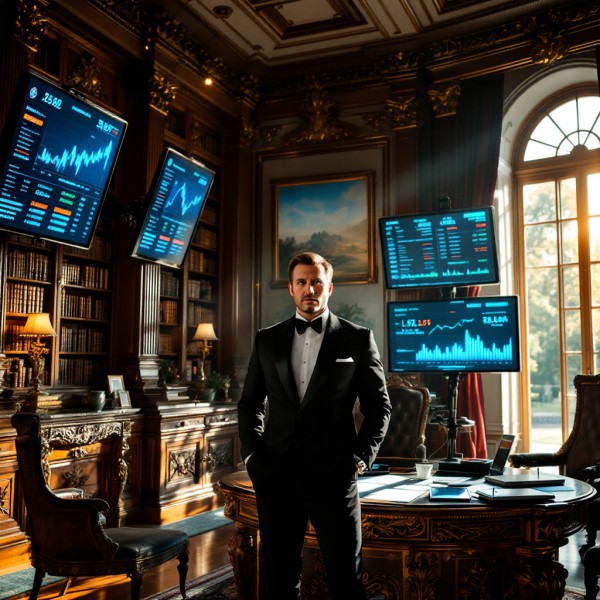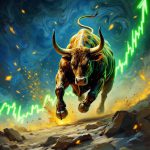Jeremy Grantham Predictions: On Mark or Wide Misses
April 18, 2025
Jeremy Grantham is either Cassandra in a Bloomberg suit or the Dow Jones version of a doomsday cult leader with a spreadsheet. And maybe—just maybe—he’s both. Perhaps that’s the point.
In a financial world addicted to dopamine, speed, and the warm glow of quarterly gains, Grantham arrives like a cold, wet fog: slow, chilling, persistent. His voice doesn’t boom. It drips. Decade after decade, it stains the walls of bullish consensus with warnings: asset bubbles, mean reversion, ecological collapse, demographic doom. When he speaks, the room doesn’t always listen. But the ground remembers.
The Clockmaker’s Curse
Let’s tear into the metaphor: the broken clock. Twice a day it’s right, sure. But what if it’s not broken? What if it’s set to a different time—cosmic time, geologic time, the kind of time that doesn’t flatter earnings reports or fit neatly into a CNBC chyron?
Grantham’s predictions don’t always hit the trading calendar sweet spot. They uncoil slowly, like tectonic plates grumbling toward inevitability. He doesn’t trade waves. He maps fault lines. Most ignore them… until the quake.
That’s not a flaw. That’s the curse of vision stretched too far ahead of the herd’s eyes.
Boom, Bust, and the Cult of Amnesia
“Jeremy Grantham’s predictions” tend to arrive just as the party hits its peak. Everyone’s drunk on innovation, euphoria, and infinite central bank liquidity. He steps in with a glass of bitter truth: This too shall burst. The cycle is older than you. Markets may forget, but human nature doesn’t evolve that fast.
He warned of the dot-com bubble before it collapsed. He sounded alarms pre-2008. He’s called today’s everything-bubble a “superbubble” on par with 1929 and 2000—and people roll their eyes because it hasn’t popped… yet.
We don’t doubt him because he’s wrong. We doubt him because we fear he’s right, and our portfolios aren’t ready.
Mean Reversion as Religion or Rebellion
To Grantham, valuation isn’t a suggestion—it’s gravity. Mean reversion isn’t optional. You can fly above the clouds of speculation for years, but eventually, you run out of fuel.
But here’s where it gets weird: in a post-QE, AI-hyped, meme-stock market, has the mean itself moved? What happens when gravity bends? If the central banks rewrite the rules of risk, are we in a new orbit, or just further from the crash?
This is where his framework feels both prophetic and precarious. He’s not wrong—but maybe reality is glitching. Or perhaps the market isn’t one market anymore, but a swarm of entangled feedback loops powered by leverage, algos, and belief systems.
Archetypes of Collapse
Grantham isn’t just a data guy—he’s an archetypal whisperer. Every bubble is the same story in different clothes: Icarus, Narcissus, Babel—greed dressed as genius. Innovation metastasised into speculation. He isn’t predicting the future so much as diagnosing patterns that repeat because people don’t change.
But the danger of myth is dogma. And even myths evolve. Today’s market is an ouroboros: it eats its own volatility, digests its fear. The crowd isn’t just irrational—it’s reflexive. Conscious of its delusions and trading them anyway. It’s not a tulip craze—it’s performance art with derivatives.
Grantham says the emperor has no clothes. The crowd shrugs. “We know,” they laugh, “but he’s jacked.”
Climate, Demographics, and the Ghost Markets to Come
Where Grantham veers off the Wall Street rails is his insistence on the long-term: ecological limits, ageing populations, and soil depletion. To most traders, this is noise. To Grantham, it’s a signal.
His battle isn’t just with irrational markets—it’s with time horizons that are fundamentally out of sync. Traders think in minutes, funds in quarters, Grantham in decades. He’s trying to run climate models on a dopamine-fueled casino. It’s like using a telescope in a rave.
But here’s the kicker: if he’s even half right, then the current market euphoria is not just misplaced—it’s suicidal.
Strange Attractors and the Prophet of Friction
Zoom out: Grantham’s predictions are strange attractors. They don’t always predict price. They predict pressure. Friction. The limits of motion. They’re the ghosts in the algorithm—whispers from the edge of the map.
He may not know when the market turns. But he knows why. And in the nonlinear reality of crowd behavior, sometimes the why is the only thing worth tracking. It’s the fingerprint of collapse before the fall. It’s the scent of smoke before the flames.
And sometimes, the prophet isn’t there to trade the crash. He’s there to name it.
The Market as a Mirror That Lies
Let’s not pretend this is just about one man. This is about the crowd’s relationship to discomfort, uncertainty, and contradiction. Grantham embodies a type of psychological resistance—slow, sceptical, hard to monetise. The system is optimised for momentum, not caution. For narrative, not nuance. For growth, not limits.
So what does the market do with a voice like his?
It punishes. Ridicules. Ignores. Until the moment comes when the bubble bursts, and suddenly every podcast is quoting his old letters like they were scripture.
Then the cycle resets. And the next time he warns… the same shrug. Because we’d rather be rich than right. Until we’re neither.
Jeremy Grantham Predictions – Scorecard of a Reluctant Prophet
| Prediction | Hit / Miss / Total Whiff | Commentary |
|---|---|---|
| Dot-Com Bubble Collapse (Late 1990s) | Hit – Bullseye to the Brainstem | Called it when most were high on “new economy” fumes. Nailed overvaluation, froth, and mania. The market crashed hard in 2000. |
| 2008 Financial Crisis | Savage Hit – Pre-Crash Precision | Warned of systemic instability well before Lehman. He didn’t just ring the bell—he pulled the fire alarm while everyone else was lighting cigars. |
| Post-2009 Bull Market Scepticism | Miss – Fumbled the Rebound | Doubted the rebound’s durability. The market defied gravity for over a decade. He underestimated the staying power of coordinated monetary intervention and herd-driven euphoria. |
| Emerging Markets (2010s) | Missed by a Mile – Faceplant into Fantasy | Predicted EM would crush developed markets in the 2010s. Instead, EM underperformed, stuck in currency crises, debt traps, and geopolitical landmines. |
| Commodities Supercycle (2011) | Miss – Rode the Wrong Tiger | Called for a sustained commodity boom. Instead, commodities collapsed post-2011. China cooled. Oil drowned. Copper crumbled. It wasn’t just wrong—it was financially radioactive. |
| U.S. Equity Overvaluation (2013–2019) | Chronic Miss – Eternal Bear Mode | Repeated warnings of overvaluation. S&P laughed in his face, climbing relentlessly. Mean reversion never came. QE rewrote the damn mean. |
| Housing Bubble 2.0 (2020–2023) | Premature Miss – Gun Jumped | Warned of a housing bubble post-pandemic. While prices soared unsustainably, the crash he foresaw didn’t hit (yet). Time may still redeem it, but he called the sirens early. |
| “Superbubble” Warning (2021–2022) | Pending – Clock Still Ticking | Called it a “superbubble” akin to 1929/2000. The market did correct in 2022, but bounced back fast. If the next leg down comes, he gets vindicated. If not, another doomer echo in the wind. |
| Climate Change as Investment Risk (2010s–Now) | Hit – Visionary but Too Soon | Way ahead of the pack. Now, ESG, climate risk, and carbon pricing are mainstream—but back then, he was dismissed as fringe. History is catching up. |
| Value Over Growth Long-Term (2020–Present) | Weak Hit – But Still Punches | Value had a moment post-2020, but tech keeps eating the world. He was early. He may be right long-term, but markets aren’t on his timetable. |
| Japan’s Equity Revival (2020s) | Fresh Hit – Ninja-Level Timing | He called Japanese equities undervalued just as they began breaking out of a decades-long slumber. Not flashy, but sharp. |
| U.S. Economic Decline (Demographics & Debt) | Macro Truth, Micro Fail | He’s not wrong about the long-term structural decline—but the market doesn’t price long-term decay. It prices stimulus, hopium, and stock buybacks. |
| Global Food & Soil Crisis (2010s–Now) | Hit – Ignored Prophet in a Starving World | Talked about soil degradation and ag collapse before the mainstream even whispered it. It’s not priced in yet—but it’s happening. Systemic risk, slow-burn style. |
| Bubble in Profit Margins (Mid-2010s) | Miss – Capitalism Mutated First | Called historic profit margins unsustainable. But margins got stickier, not mean-reverting, thanks to tech monopolies and financial engineering. Reality adapted faster than the theory. |
| Cryptocurrency Bubble (2017–2021) | Hit – Called Speculation for What It Was | Dismissed most crypto as hot air. And while Bitcoin survived, thousands of altcoins vaporised. Called it when crypto bulls were hallucinating Lambos. |
| AI Mania (2023–Present) | Yet to Call – Silent or Waiting | No major statements. Possibly holding fire. Maybe waiting for the next AI IPO blowout before weighing in. Or maybe he’s calculating the bubble coefficients. |
| Globalisation Peak / Deglobalization Theme | Hit – Silent Currents Exposed | Quietly nailed the trend long before COVID and geopolitics made it fashionable. He didn’t scream about it, but he didn’t need to. The tectonics moved anyway. |
| US Dollar Doom Overstated | Hit – Avoided the Doom-Mongering Pitfall | Unlike gold bugs, he didn’t jump on the dollar-collapse train. Smart restraint. The greenback still rules the playground. |
| Green Tech Overvaluation (SPACs & Hype Stocks) | Hit – Shot Through the Bubble | He warned early that green tech stocks were getting bubbly, even if the mission was noble. SPACs imploded. Tesla corrected. He clocked the froth. |
Binary Brains, Fractal Realities
Grantham doesn’t give you clean predictions. He provides you with probabilities soaked in history and edged with existential dread. The problem? Most traders don’t want ambiguity. They want to buy/sell. Now/later. Up/down.
But the market isn’t binary. It’s fractal. It spirals. It folds back on itself. It rewards the mad and the patient in unequal measure. It’s less like a casino and more like a mythic maze with shifting walls.
Grantham sees the maze. But traders are counting cards. That’s the disconnect. And that’s why his voice sounds out of place—it’s tuned to deeper frequencies.
The Meta-Trader and the Long Defeat
There’s a haunting nobility to Grantham’s stance. He’s playing a long game in a system built for sprinting. It’s not just about calling tops—it’s about refusing to sell out to the froth.
He’s the monk in the temple as barbarians party outside. He knows the walls will crack. He knows the gods of valuation will rise again. But he also knows he may not live to see it.
That’s the tragedy of the true long-termist. You’re not trading for glory. You’re warning for survival.
So… Broken Clock or Prophet?
False binary. He’s neither. He’s a tuning fork, vibrating at a frequency most choose to ignore. Not always on time. Not always precise. But deeply, structurally right in ways that only become obvious when it’s too late to act.
To call him a broken clock is to admit you can’t handle time that moves like a glacier and strikes like a meteor. To contact him, a prophet is to expect certainty in a probabilistic storm.
He’s neither. He’s a riddle disguised as a chart. A warning carved into stone. A mirror held up to our hubris.
And when the next collapse comes—as it always does—his voice will echo through the rubble, not with “I told you so,” but with the heavier truth: “You knew. You just didn’t want to believe.”















